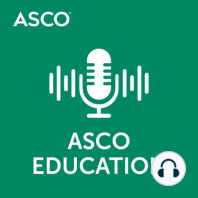5 min listen

New Drugs: Ivosidenib for Relapsed or Refractory Acute Myeloid Leukemia with Susceptible IDH1 Mutation
FromASCO Education
New Drugs: Ivosidenib for Relapsed or Refractory Acute Myeloid Leukemia with Susceptible IDH1 Mutation
FromASCO Education
ratings:
Length:
5 minutes
Released:
Dec 12, 2018
Format:
Podcast episode
Description
In this week's episode, Dr. Danielle Shafer, Medical Director of the Clinical Trials Office at Massey Cancer Center at Virginia Commonwealth University, explores the recent FDA approval of ivosidenib for the treatment of relapsed or refractory acute myeloid leukemia. Dr. Shafer's primary clinical focus is leukemia & lymphoma in adult patients. Her research focus is limited to the same population, with a particular interest in relapsed/refractory AML. If you enjoyed this podcast, make sure to subscribe for more weekly education content from ASCO University. We truly value your feedback and suggestions, so please take a minute to leave a review. If you are an oncology professional and interested in contributing to the ASCO University Weekly Podcast, email ascou@asco.org for more information. TRANSCRIPT [MUSIC PLAYING] Welcome to the Recent Approvals episode of the ASCO University Weekly Podcast. My name is Danielle Shafer, and I'm an assistant professor at the Massey Cancer Center at Virginia Commonwealth University. My area of specialty is leukemia and lymphoma. Today, we will discuss the approval of ivosidenib in patients with relapsed and refractory AML with a susceptible IDH1 mutation. As a background to today's discussion, somatic mutations of IDH have been identified in multiple tumor types, including AML and MDS. As a result of the mutation, there is impaired hematopoietic differentiation, as well as epigenetic alteration. IDH mutations occur in approximately 20% of adults with AML, and 5% of adults with MDS. IDH1 mutations occur in approximately 6% to 9% of adult AML patients. Enasidenib was approved by the FDA in 2017 for adult patients with relapsed and refractory AML with an IDH2 mutation. On July 20, of 2018, ivosidenib was approved by the FDA for the treatment of adult patients with relapsed and refractory AML with a susceptible IDH1 mutation, as detected by an FDA approved test. The approval of ivosidenib in the relapse to refractory setting was based on the results of a phase I dose escalation and dose expansion study published in the New England Journal of Medicine. The primary objectives of the study were to assess the safety, maximum tolerated dose, and recommended phase II dose. Of the 258 patients receiving study drug, 179 patients had relapsed and refractory disease. The median age was 67, with a range of 18 to 87 years. Patients had a median of two prior therapies, 24% had relapsed after transplant, and 59% were refractory to induction or re-induction. 59% had favorable cytogenetics. The most common co-occurring mutation was NPM1 in 26% of patients. A maximum tolerated dose was not defined, and ivosidenib 500 milligrams was selected for dose expansion. The most common adverse reactions were fatigue, leukocytosis, arthralgia, diarrhea, dyspnea, edema, nausea, mucositis, Q/T prolongation, rash, pyrexia, cough, and constipation. In the overall population, 30 day all-cause mortality was 7%. The majority of deaths were related to disease progression or complications of underlying AML. No treatment-related adverse events leading to death were seen in patients with a starting dose of 500 milligrams. IDH differentiation syndrome is of special interest, as early identification is necessary. It is similar to what has been described with ATRA and arsenic trioxide. In this study, IDH differentiation syndrome was reported in 19 patients, and was of grade 3 or higher in nine patients. Leukocytosis grade 2 or 3 accompanied differentiation syndrome in 7 of the 19 patients. Median time to onset was 29 days, with a range of 5 to 59 days. Treatment included glucocorticoids, diuretics, and hydroxyurea, if leukocytosis was present. With intervention, 17 of the 19 patients had resolution. The two remaining patients had differentiation syndrome at data cutoff. In the relapsed refractory population, the rate of complete remission or complete remission with partial hematologic recovery was 30.4%. The median duration of comple
Released:
Dec 12, 2018
Format:
Podcast episode
Titles in the series (100)
ASCO Guidelines: Pancreatic Cancer: ASCO Guidelines: Pancreatic Cancer by ASCO Education